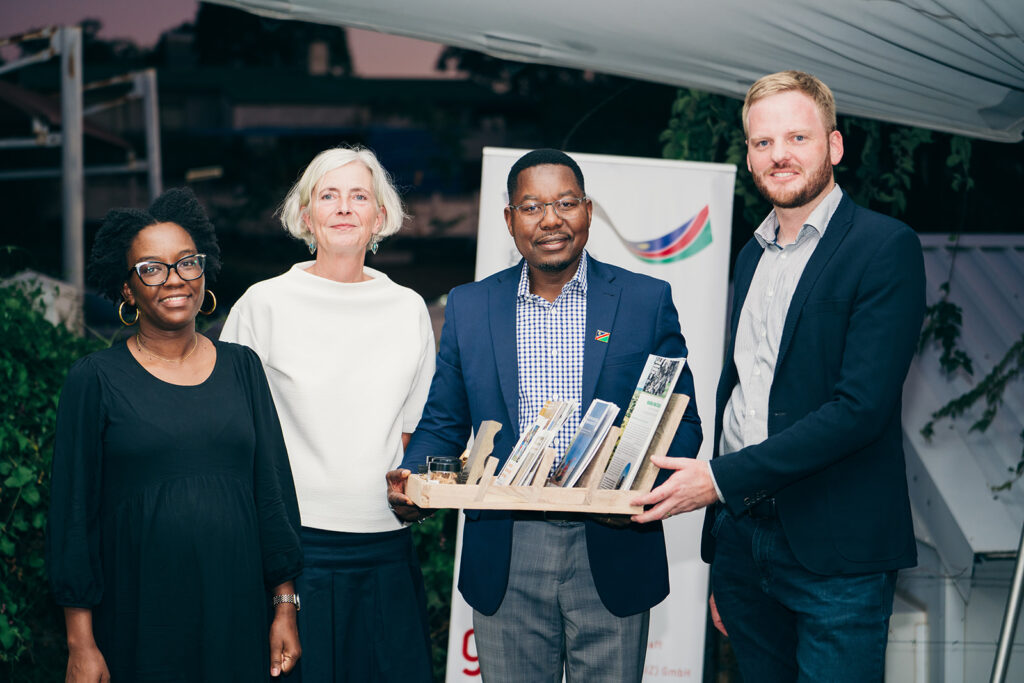This project was one of the cornerstone initiatives supporting governments efforts to combat bush encroachment in Namibia, and we are going to miss it. It played a pivotal role in shaping strategies and approaches on bush control and enhancing the capacities of farmers and entrepreneurs to create value chains,’ said Timoteus Mufeti, Environmental Commissioner, Ministry of Environment, Forestry and Tourism at the closure event of the ‘Bush Control and Biomass Utilisation’ (BCBU) project. The project launched in 2014 as the ‘Support to De-bushing Project’ and wraps up this month, after 10 years of implementation. The BCBU project promoted the sustainable utilisation of encroacher bush-based biomass, thereby contributing to rangeland restoration and economic development in Namibia. ‘The way that government institutions, civil society, academia and private sector have aligned their interests around the topic of bush encroachment is unique. As a development partner, we take pride in the achievements and fruitful cooperation with the Namibian Ministry of Environment and Ministry of Agriculture over the past decade on this project,’ Ulrike Metzger, Head of Development Cooperation of the German Embassy pointed out.
Over the past 10 years, the biomass sector in the country has experienced enormous change. A decade ago, farmers were isolated in their struggle to ‘de-bush’ their land, to improve grazing, groundwater recharge and biodiversity. Today, Namibia is seeing a paradigm shift: from ‘de-bushing’ to ‘bush control and biomass utilisation’. What was once considered only a problem now also presents an opportunity.
Employment in bush harvesting and processing has doubled from 6,000 to 12,000 between 2016 and 2024. The charcoal value chain has increased six-fold in terms of revenue. Animal feed based on milled encroacher bush is being produced on farms and substitutes imported commercial feeds. More than 900 farmers produced bush-based animal feed for 120,000 animals during the 2019 drought. A wood-plastic-composite factory started production in Windhoek, producing flooring material from wood and recycled plastic and a broad array of further value addition opportunities is being explored. The new star on the horizon is biochar, a product similar to charcoal but made from smaller branches. The application of biochar can improve Namibian soils, thereby contributing positively to climate change adaptation and mitigation. ‘Biochar Credits’ can then be traded on international carbon markets and bring revenue into the country.
The BCBU project placed a strong emphasis on collaboration with government, the private sector, academia, farmers’ unions and civil society. Johannes Laufs, team leader of the BCBU project, thanked the guests: ‘Without our project stakeholders there would have been no impact. Every single one of the 12,000 jobs in the bush-biomass sector was created by the private sector. Every single decision that helped to create a conducive environment, was taken by government. We have supported, promoted, enabled. You have achieved impact.’
Building institutional capacity for the sector was a focus of the project and today sector organisations such as the Namibia Biomass Organisation (N-BiG) and the Charcoal Association of Namibia (CAoN) effectively support knowledge exchange and technology transfer. They leverage international cooperation networks and enable an efficient public private dialogue.
The BCBU project also supported the formulation of national policy and strategy frameworks for the bush-biomass sector, most notably the National Strategy on the Sustainable Management of Bush Resources 2022-2027 (MEFT 2022).
Lessons learned show that it was extremely beneficial for the governance of the sector to establish a Steering Committee, which was chaired by the National Planning Commission and included a wide representation from public sector institutions including agriculture, environment, industry, energy, labour and private sector stakeholders.
At the onset of the project, lack of knowledge transfer and documentation of good practices was identified as an impediment to sector development and thus BCBU placed a focus on communication and knowledge products. The project not only commissioned technical studies but put processes in place that ensured that each one of them would translate into summarised information products, including brochures, posters, videos, decision support tools and similar formats. Today, the Namibian bush biomass sector is well researched and documented, local research being spearheaded by the national universities, Namibia University of Science and Technology (NUST) and University of Namibia (UNAM) through commissioned applied research assignments and international research cooperations.
The bilateral Bush Control and Biomass Utilisation project was commissioned by the German Federal Ministry for Economic Cooperation and Development (BMZ) and implemented by the Deutsche Gesellschaft für Internationale Zusammenarbeit (GIZ) in cooperation with the Namibian Ministry of Environment, Forestry and Tourism (MEFT) from 2014 to 2024.
45 million hectares of Namibian land are considered ‘bush encroached’. Local bush species are thickening on land that should be open savannah. This bush encroachment is caused by indigenous bush species. These species can have positive effects on ecosystems and support important ecological processes. However, the extreme thickening of bush is often associated with considerable negative impacts on the productivity of land, biodiversity, water availability and livelihoods.

